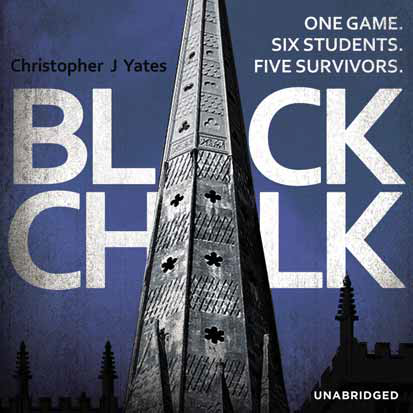Drawn in Black Chalk
Hannah Edmondson interviews Christopher Yates on the inspiration behind his university-set psychological thriller.

It started out as a game to win £10,000, but the stakes were so much higher than expected. Christopher Yates’ Black Chalk centers on six Oxford first years who set out to play the ultimate game. Not a game of fake money or expanding colonies, but a psychological game that asks its players to risk what they cherish most: their self-images, their lives.
While predictable twists and unrealistic events might be expected from a thriller like this, Yates truly excels in suspenseful plot development. The novel begins in first person narration by a character the author describes as “a hermit living a peculiar life driven by strange routines.” As the story progresses, so does the reader’s relationship with the narrator and by extension, the characters. Page by page the reader becomes more acquainted with this isolated narrator and his tale only to secondguess everything learned because of one sentence or hint.
These cruel realizations and stunted growth reflect the narrator’s own experience. His return to his youthful past shows that this story is not a coming of age, but rather an anti-bildungsroman. The narrator has not grown in life; he has shrunk until all he knows are the bedroom walls in his poky Manhattan apartment. Yates juxtaposes this cloistered deterioration with the unending optimism originally present in the university setting. When asked why he chose Oxford as his story’s location, the author and former alum said, “I love the age of the characters and their youthful enthusiasm for holding certain beliefs, for their desire to experience life.”
The Oxford setting also fuels the characters’ increasing interest in the game. The competitiveness between these university friends is what elevates the game to such unpleasant heights. The rivalry is present from the beginning, when the group tries to outdo each other’s underprivileged backgrounds, and becomes increasingly more vicious as the story goes on. The tipping point comes when the narrator critiques another player’s intelligence, for while “obscenities were not terms with which they could hurt or offend one another, such words meant almost nothing […] never had any of them called another stupid.” Through the backdrop of the game, the author explores this theme of competitiveness, so prevalent in campus life, while ridiculing the students’ conceit.
However, not everything is gloom and doom in this tale. Yates offers comic relief through Jack, the typical clown of the group, and the obscure memory techniques of the narrator. In one passage, the narrator is standing naked above a salad bowl trying to remember what the mnemonic device represents. He eventually realises the undressed salad is a reminder for him to clothe himself. While Yates depicts a brutal side to humanity, he inserts humorous scenes and realistic situations, such as six friends hanging out at the pub or one student staying up all night to finish the three papers he has due the next day, to make his characters relatable, and identifiable. It’s like Lord of the Flies in a familiar setting.
Nothing is quite what it seems in Black Chalk. The game, the characters, the narrator are not as straightforward as they first seem, for, as the author reminds us in the introduction, nothing in this tale is to be trusted. Even the motives behind the individuals are unreliable, making readers question what truly drives people.
Once the characters move past the ingrained social rules of being respectful to others, caring for all, loving their neighbors as themselves, they see what actually motivates them: power, success, and the desire to be loved. Once the white chalk rules are erased, the characters’ genuine outlines are revealed, drawn in plain black chalk.
Hannah Edmondson: What was the inspiration behind Black Chalk? Christopher Yates: The inspiration for Black Chalk came from real life. I really did have an idea to play a game of psychological dares much like the one played in my story. This was something me and my friends chatted about in the bar a great deal, trying to come up with interesting forfeits for each other. I think it’s very fortunate that we never did play because it means we’re all still friends.
HE: How did your personalexperience at Oxford influenceyour novel? CY: There’s a lot of my own personal experience in_ Black Chalk_. Not a single one of the events that occur in the book actually took place in reality but I used my own experience to shape the settings and plot. And it was my own experience of Oxford that helped me in trying to build as plausible a tale as possible. I suppose you might say that my own Oxford experiences are the DNA of Black Chalk.
HE: Why did you choose a university setting? CY: I loved everything about writing a novel that used a university for its setting. I loved the age of the characters and their youthful enthusiasm for holding certain beliefs, for their desire to experience life. The intimacy of such a setting is also a huge plus to a writer; I went to a college of around 400 people which meant that, to some degree, I knew just about everyone there, and this creates an atmosphere that can be both excitingly convivial and frighteningly suffocating. All excellent ingredients.
HE: In what way do you see this novel as a bildungsroman or rather a missed bildungsroman? CY: Yes, I suppose there’s a sense in which it’s a bildungsroman in reverse because what we see is not the psychological growth of someone but actually their decline. The narrator doesn’t come of age in the world so much as want to lock themselves away from the world that’s uncovered.
HE: Which of the characters didyou find it hardest to write about? CY: The narrator was the hardest character for me to pin down. The story is told fourteen years on from when the game began. We know right from the start that the narrator’s been damaged by this mysterious game and that the narrator is a hermit living a peculiar life driven by strange routines. So the narrator has no one to talk to but the reader, which means I had to find a way to suck the reader in without using any dialogue between characters (and I have a particular love for writing dialogue). So this was a challenge to write. But challenges can be fun. And challenges can also lead to bursts of creative thought. So in the end, I was very happy with my peculiar hermit.
HE: Which authors are you influenced by? CY: Graham Greene for his sense of writing meaningful books with great prose; but not for one second does he ever forget to entertain and beguile his reader. And this is something Donna Tartt does brilliantly as well. Also Vladimir Nabokov for his love of language and games (he is constantly toying with his reader, a chess player who’s several moves ahead of you). And I love great sentence-writers such as Martin Amis, John Updike and Cormac McCarthy.
Black Chalk by Christopher J Yates is published by Random





